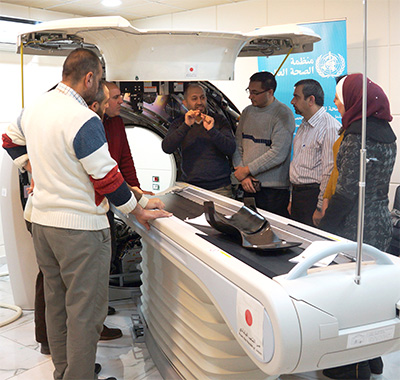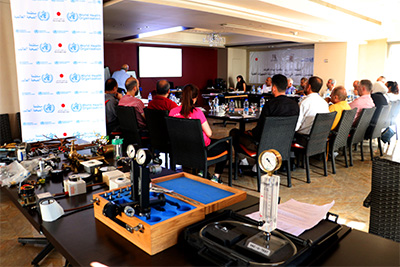 10 February 2020 – WHO welcomes the generous support from the Government of Japan to conducted training courses for Ministry of Health and Ministry of Higher Education engineers through the “ Training for All – (T4A)” project on acquiring the know-how in installing and maintaining lifesaving and state of-the-art medical equipment at health facilities inside Syria.
10 February 2020 – WHO welcomes the generous support from the Government of Japan to conducted training courses for Ministry of Health and Ministry of Higher Education engineers through the “ Training for All – (T4A)” project on acquiring the know-how in installing and maintaining lifesaving and state of-the-art medical equipment at health facilities inside Syria.
“Equipping health facilities with the right technology while building the teams’ technical skills will undoubtedly have a sustainable impact on the quality of medical services provision for years to come” said Dr Nima Abid, acting WHO Representative in Syria. “Training medical engineers and technicians on installing and maintaining equipment, in addition to scaling up their basic medical skills, is key to reducing the number of preventable deaths,” added Dr Abid.
With this kind contribution, WHO provided training for biomedical engineers on the installation, maintenance and proper use of advanced medical equipment. WHO also provided training for civil engineers and architects in the areas of design, maintenance and rehabilitation of health facilities. The training was supplemented by site visits to the various project locations to ensure proper implementation and smooth progress of activities.
 The T4A project consists of three phases and was first implemented in April 2017. The project was introduced in the governorates of Damascus, Homs, Aleppo, Daraa, Hama, As-Swieda, Lattakia, Tartous and Deir-ez-Zor. More than 625 medical engineers and technicians have been effectively trained on the use and maintenance of different types of X-rays, CT scan, catheterization, angiography and MRI machines, as well as endoscopy, ophthalmic and operation room equipment, and laboratory and physical therapy equipment. Phase III of the project was launched in April 2019, targeting 160 trainees.
The T4A project consists of three phases and was first implemented in April 2017. The project was introduced in the governorates of Damascus, Homs, Aleppo, Daraa, Hama, As-Swieda, Lattakia, Tartous and Deir-ez-Zor. More than 625 medical engineers and technicians have been effectively trained on the use and maintenance of different types of X-rays, CT scan, catheterization, angiography and MRI machines, as well as endoscopy, ophthalmic and operation room equipment, and laboratory and physical therapy equipment. Phase III of the project was launched in April 2019, targeting 160 trainees.
“The training was highly interactive and comprehensive; the discussions were lively, and the question-and-answer sessions were really helpful. I have a very good understanding of the X-ray machines now and will be able to spot any defects,” said Emtithal Babi, a medical engineer from the governorate of Aleppo. “We thank WHO and the people of Japan for supporting this training, which is so important for our health system,” she added.
The success of the T4A projects is well documented. The biomedical engineering training programmes, which were delivered by trained national experts, have helped in disseminating technical knowledge of basic medical equipment management, troubleshooting and repairs at the health facilities level. As a result, improvements in problem-solving and equipment downtime were observed across the Ministry of Health and Ministry of Higher Education health facilities. The programme will enable trained specialists to fully utilize the skills they have learned and to keep medical equipment functioning optimally for years to come. This will in turn greatly improve patient outcomes.


